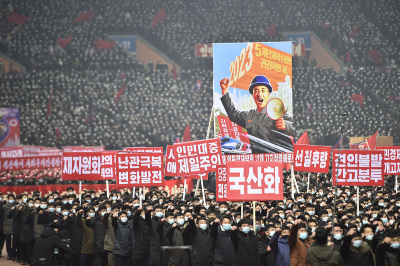North Korea’s rejection of reunification may seal the fate of its secret Christians

Standing before the Supreme People’s Assembly in January, North Korean leader Kim Jong Un called the “Arch of Reunification,” a monumental sculpture symbolizing the hope for reunification with South Korea, an “eyesore.” Within days, the massive installation vanished from satellite imagery, quickly demolished by Kim’s regime.
In the very same speech, Kim declared that reunification with the South was no longer possible and demanded that the North Korean constitution be amended to identify South Korea as the “number one hostile state.”
None of Kim’s inflammatory comments or actions are particularly surprising at this point. He has a long and well-known track record of making saber-rattling threats, test-firing long-range missiles, and viciously oppressing his own people. He's worked to cut off communications with the South for years, even releasing footage of blowing up a joint liaison office with the South that was intended to help the two countries correspond.
Kim’s behavior has made it quite clear that he will never reunify. No amount of negotiation will change his mind for one simple reason — he is the supreme leader of a rogue nation who believes he is a god in his own mind. Because of that, North Koreans — particularly Christians and people of faith — continue to suffer tremendously.
Kim is the head of the Workers’ Party of Korea, which enforces an ideology known as Kimilsungism-Kimjongilism. Named after Kim's grandfather and father, the set of beliefs follows the words and the teachings of the dictators. From an early age, North Koreans are forced to strictly adhere to the “unconditional obedience in accomplishing the instructions” given by the Kim family and the Party’s lines and policies. North Korean defector and human rights campaigner Yeonmi Park has said that she was taught in school that Kim Jong Il was a god who could read the minds of everyday citizens. Children also learn that Kim Il Sung was a supernatural being who used a deflection technique to avoid bullets in battle.
Any deviation in belief in this mandated philosophy is met with harsh punishment, including imprisonment, torture, and even execution. Those who practice any form of religion belong to the “hostile” class and are considered enemies of the state. No room is left for alternative belief systems, like Christianity, which are seen as existential threats, and drive North Korea’s ongoing egregious religious violations. This makes the country one of the most difficult places in the world for Christians, with some estimates stating as many as 50,000-70,000 believers are currently facing horrific conditions in brutal labor camps.
There are things the US government can do to put pressure on North Korea as an attempt to address the crackdown on Christians and religious freedom. We can pass the North Korea Human Rights Reauthorization Act to support programs that reunite families. We can make sure that our Special Envoy on North Korean Human Rights Issues has the resources it needs. We can impose targeted sanctions on North Korean officials. But the reality is that although the passage of a bill might change something, we’re dealing with a rogue nation — one that has voluntarily cut itself off from the world for more than 75 years and doesn’t seem interested in rejoining it.
This also means that Christians are also cut off from the world. The North Korean church isn’t your mom and dad’s church — this is a church that lives behind enemy lines. Every day, secret Christians risk their lives to follow Jesus. As fellow believers, we need to think like insurgents when supporting these brothers and sisters, providing Bibles, spiritual training, and pastoral care despite the risks. North Korean believers are crying out, but often their cries are not heard. We, as the American church, need to be the voice of the voiceless. North Koreans don’t have microphones, but we do. Our congregations, families, Bible study groups must be those microphones. At Global Christian Relief, we believe that Christians should not be alone. Let’s not let our North Korean brothers and sisters die unheard.
Dr. David Curry is President and CEO of Global Christian Relief (GCR), America’s leading watchdog organization focused on the plight of persecuted Christians worldwide. In addition to equipping the Western church to advocate and pray for the persecuted, GCR works in the most restrictive countries to protect and encourage Christians threatened by faith-based discrimination and violence.





















